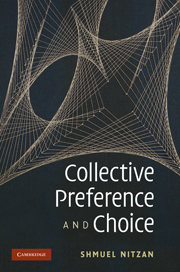Book contents
- Frontmatter
- Contents
- List of figures
- Preface
- Acknowledgments
- Part I Introduction
- Part II Different Preferences
- 4 Do social preferences exist? Arrow's and Sen's impossibility theorems
- 5 The desirable decision rule: axiomatization
- 6 Rule selection based on compromise with the unanimity criterion
- 7 Paradoxes of voting
- 8 Majority tyranny
- 9 The problem of inefficient provision of public goods
- 10 Do individuals reveal their true preferences?
- Part III Identical Preferences, Different Decisional Skills
- Bibliography
- Author index
- Subject index
6 - Rule selection based on compromise with the unanimity criterion
Published online by Cambridge University Press: 05 June 2012
- Frontmatter
- Contents
- List of figures
- Preface
- Acknowledgments
- Part I Introduction
- Part II Different Preferences
- 4 Do social preferences exist? Arrow's and Sen's impossibility theorems
- 5 The desirable decision rule: axiomatization
- 6 Rule selection based on compromise with the unanimity criterion
- 7 Paradoxes of voting
- 8 Majority tyranny
- 9 The problem of inefficient provision of public goods
- 10 Do individuals reveal their true preferences?
- Part III Identical Preferences, Different Decisional Skills
- Bibliography
- Author index
- Subject index
Summary
Consensus on desirable properties of the social preference relation may lead to a “dead end,” when the expected resolution of the social choice problem is the axiomatization of the social preference relation. This is one of the lessons of Arrow's impossibility theorem presented in Chapter 4. Nevertheless, agreement on the desirable properties can result in axiomatization, that is, in a unique characterization of the social preference relation or of the social choice rule, as we have seen in the previous chapter. But there is a third possibility. Agreement on desirable properties may lead to the identification of many social preference relations or many social choice rules that satisfy the desirable properties. The meaning of such a situation is that the search for the appropriate social preference relation or social choice function has resulted in “excessive success,” which implies that the search has not ended. In other words, such success enables the selection of a desirable rule, but there is still an indeterminacy problem that raises the question: What is the most desirable rule, the rule that should be selected out of the rules satisfying the desirable properties? In this chapter we propose the metric approach of compromising with the unanimity criterion to resolve this problem.
THE UNANIMITY CRITERION
Naturally, identification of many social choice functions is expected when agreement on the desirable properties is limited, that is, when there are just a few agreed-upon desirable properties and, in particular, when the individuals agree on just one such property.
- Type
- Chapter
- Information
- Collective Preference and Choice , pp. 76 - 92Publisher: Cambridge University PressPrint publication year: 2009



